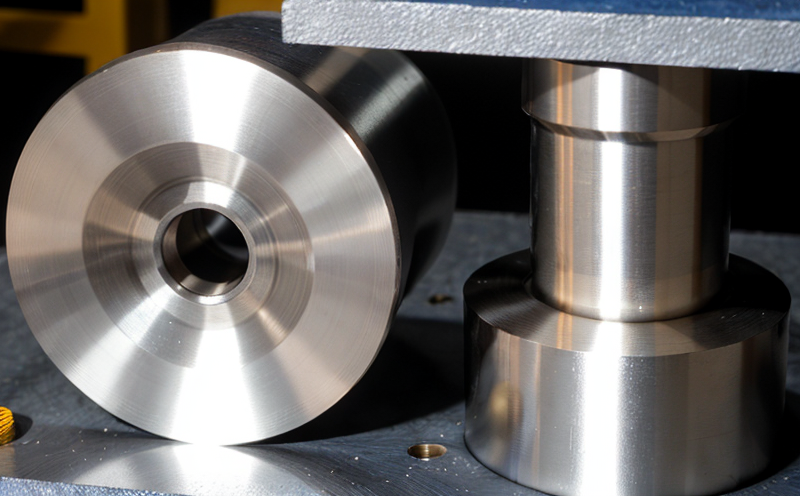ISO 11782 Fatigue Crack Growth Testing of Nanostructured Metals
The ISO 11782 standard is a critical tool for the testing and evaluation of fatigue crack growth in metallic materials, including nanostructured metals. This service focuses on the specific application within nanomaterials testing, particularly on nanostructured metals and alloys. The standard provides a robust framework to ensure that the performance and reliability of these advanced materials meet international quality standards.
Nanostructured metals are characterized by their unique microstructures at the nanoscale level, which can significantly influence mechanical properties such as strength, ductility, and fatigue behavior. By applying ISO 11782 testing protocols, we ensure that any potential flaws or weaknesses in these materials are identified early on, allowing for improvements in product design and manufacturing processes.
The fatigue crack growth process involves the initiation and propagation of microscopic cracks under cyclic loading conditions. In nanostructured metals, this process is particularly complex due to the small grain sizes and high surface area-to-volume ratios. The ISO 11782 method allows for precise measurement of crack growth rates, providing valuable insights into the durability and integrity of these materials.
Our laboratory uses advanced testing equipment capable of simulating real-world loading conditions while monitoring crack growth with high precision. Specimen preparation is crucial in this process; it involves careful selection of samples that accurately represent the intended application. Once prepared, specimens are subjected to cyclic loading until fatigue cracks begin to form and grow.
The testing procedure adheres strictly to ISO 11782 guidelines, ensuring consistent results across various batches and laboratories. Key parameters include stress intensity factor range (ΔK), total number of cycles, initial crack length, and environmental conditions such as temperature and humidity. These factors can significantly affect the fatigue behavior of nanostructured metals.
| Application Area | Description |
|---|---|
| Aerospace Engineering | Critical components like turbine blades and fasteners require stringent fatigue testing to ensure long-term reliability. |
| Automotive Industry | Fuel injectors, valves, and other engine parts must withstand extreme stress cycles without failure. |
| Marine Engineering | Ocean-going vessels use nanostructured metals in propellers and shafts to enhance durability in harsh environments. |
| Medical Devices | Bio-compatible implants need fatigue testing to guarantee safe and effective performance over extended periods. |
- Aerospace Engineering: Turbine blades, fasteners, structural components.
- Automotive Industry: Fuel injectors, valves, engine parts.
- Marine Engineering: Propellers, shafts, hull structures.
- Medical Devices: Bio-compatible implants, surgical tools.
Industry Applications
The testing of nanostructured metals and alloys using ISO 11782 is essential across multiple industries where the reliability and performance of materials are paramount. This service supports various sectors including aerospace, automotive, marine engineering, and medical devices.
- Aerospace Engineering: Ensuring the integrity of critical components such as turbine blades, fasteners, and structural parts is vital for maintaining safety in flight operations.
- Automotive Industry: Fuel injectors, valves, and other engine parts must be durable enough to withstand millions of cycles without failure.
- Marine Engineering: Propellers, shafts, and hull structures made from nanostructured metals can enhance the durability and efficiency of ocean-going vessels.
- Medical Devices: Bio-compatible implants need fatigue testing to guarantee safe and effective performance over extended periods. This ensures that medical devices do not fail prematurely under biological stresses.
Eurolab Advantages
At Eurolab, our commitment to excellence in nanomaterials testing is reflected in several key advantages:
- State-of-the-Art Facilities: Our laboratory houses some of the most advanced equipment available for fatigue crack growth testing.
- Experienced Technicians: Highly skilled staff with extensive experience in nanomaterials and ISO 11782 testing ensure accuracy and reliability.
- Comprehensive Reporting: In-depth reports are provided, detailing every aspect of the test process and results.
- ISO Compliance: We adhere strictly to all relevant international standards to guarantee consistency and quality.
Environmental and Sustainability Contributions
The testing of nanostructured metals using ISO 11782 contributes positively to environmental sustainability by ensuring that materials used in critical applications are reliable and durable. This reduces waste and extends the lifecycle of products, thereby minimizing resource consumption.
- Reduced Waste: By identifying potential failures early in the development process, less material is wasted during manufacturing.
- Extended Product Lifespan: Ensuring that components and structures are robust against fatigue helps extend their useful life, reducing the need for replacements.





